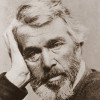“ As in all religions, man is freed of the weight of his own life. ”
Albert Camus, The Myth of Sisyphus (1942). copy citation
| Author | Albert Camus |
|---|---|
| Source | The Myth of Sisyphus |
| Topic | religion life |
| Date | 1942 |
| Language | English |
| Reference | |
| Note | Translated by Justin O'Brien |
| Weblink | http://www2.hawaii.edu/~freeman/courses/phil360/16.%20Myth%20of%20Sisyph... |
Context
“to the extent to which it represents the emotionally moving face of man fleeing humanity, deriving from his contradictions reasons for believing, reasons for hoping from his fecund despairs, and calling life his terrifying apprenticeship in death. It is universal because its inspiration is religious. As in all religions, man is freed of the weight of his own life. But if I know that, if I can even admire it, I also know that I am not seeking what is universal, but what is true. The two may well not coincide.
This particular view will be better understood if I say that truly hopeless thought just happens to be defined by the opposite criteria and that the tragic work might be the work that, after all future hope is exiled, describes the life of a happy man.”
source


